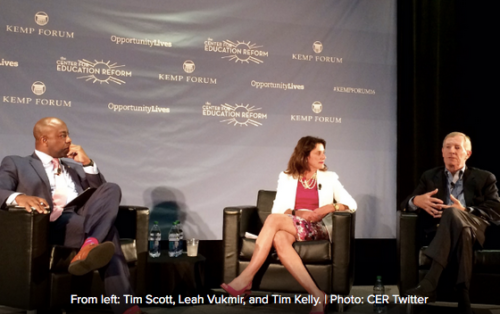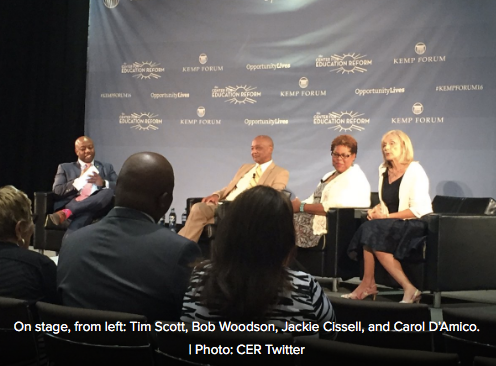Tim Scott: Education Is the “Magic” Solution to America’s Problems
“If you’re looking for the closest thing to magic in America, it’s education.”
No, not Harry Potter magic. This kind of magic, said U.S. Senator Tim Scott (R-S.C.), is the kind of public policy that can help cure society’s seemingly incurable ills.
Scott’s remarks were addressed to the Kemp Forum on Expanding Opportunity in Indianapolis, a gathering of lawmakers and activists supportive of school choice. The event, co-hosted by the Jack Kemp Foundation and the Center for Education Reform (CER), and sponsored by Opportunity Lives, focused on how education reform can best provide opportunities to those most underserved by today’s education policies.
“The school choice movement began over 20 years ago in 1994,” CER founder and CEO Jeanne Allen told the crowd. “And while we’ve made progress since then, we’ve now come to a standstill.” This lack of progress was unacceptable, Allen continued, and said it was up to leaders like Scott and those assembled to regain momentum for the school choice movement.
Scott moderated two panels, the first of state lawmakers and the second of parents and activists. To the first panel, Scott posed the question of what needs to be done in order to ensure the best outcomes for students. Leah Vukmir, the assistant majority leader for the Wisconsin State Senate, answered that empowering parents over bureaucrats should always be a top priority.
“Parents know what the best choice is for their children!” Vukmir said. “When it boils down to who do I trust, I trust the parents.”

State Rep. Tim Kelly (R-Mich.) pushed for the unbundling of federal block grants doled out by Congress and the U.S. Department of Education, and giving that control to the states to determine what best fits their needs.
Vukmir also said current education policies are doing students a disservice by forcing them into four-year colleges while ignoring vocational education programs.
Carol D’Amico, executive vice president for national engagement and philanthropy at USA Funds, emphasized the role vocational training programs can play in securing jobs for students. “Allow communities to blur the lines between education and work,” she said. “It changes everything.”
D’Amico said one of her students once told her that the keys to his success were his “ships.” When she looked at him confused, he explained his “ships” were his “internships, apprenticeships, and mentorships.” D’Amico stressed that these three “ships” are essential tools to provide students looking to transition to the workforce, especially when training the next generation of skilled laborers.

Jackie Cissell, a native of Indianapolis whose son struggled in the local public school before excelling in a charter school, echoed Allen’s warning that education reformers should not become complacent.
“There is a risk of ‘reform fatigue’,” Cissell said. “We can not afford to be tired when kids aren’t learning!”
In terms of keeping parents invested in their children’s success, Bob Woodson, the president of the Center for Neighborhood Enterprise and a star of Opportunity Lives’ “Comeback” series, reminded the audience that true reform comes from within the individual, not from external forces.
“Parents cannot be acted upon,” said Woodson. “They must be agents of their own kids’ improvement.”
On the effectiveness of charter schools, Scott pointed to the success of the D.C. Opportunity Scholarship Program, which allows District of Columbia students to attend magnet and charter schools. In the D.C. public schools, Scott explained, the cost per student is roughly $20,000, with a graduation rate of 64 percent. Meanwhile, the cost per student in the District’s charter schools was roughly $8,400, with a graduation rate of 71 percent.
“So you get a better result for less than half of the cost!” Scott exclaimed, “So why would anyone be against this?”
Gillum Ferguson is the Deputy Editor at Opportunity Lives. You can follow him on Twitter @GillumFerguson.














